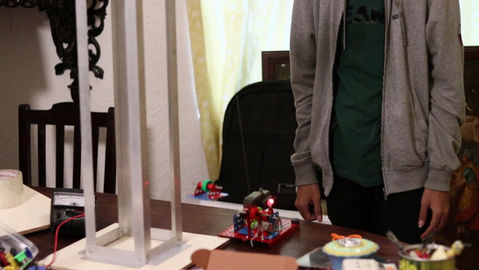
Product Design
Undergraduate Program Specialization
D. Tech Product Design + B.CA Data Sciences / Analytics
Innovate with Cutting-Edge Design and Engineering Skills.
The Product Design Undergraduate Program at NICC integrates industrial design, product development, and transportation design with emerging technologies like AR (Augmented Reality) and VR (Virtual Reality). Students learn to create user-focused, functional, and sustainable products through product engineering and prototyping, preparing for careers in industries like consumer electronics, automotive design, and smart device innovation.
Program Duration: 4 Years
Eligibility: 10, +2 & NICC Admission Process
Program Breakup
Physical (Mechanical), Electrical & Electronics Engineering + Software, AI & IOT (Internet of Things) - A unique Top-Level ProgramIncludes: Green Energy, Energy Storage, Transportation & EV Design
National & International
-
4-Year International Professional Diploma*
(NICC-ELIA Europe) with ECTS Marksheet -
International Professional Projects & Portfolio
NICC is approved by DCE (The Department of Collegiate Education, Govt. of Karnataka)
National
B.C.A Data Sciences / Data Analytics
OR
B.A Mass Communication
The above WES-accepted supporting degrees are awarded directly by the University
Specialization Areas
1. Industrial Robotics Automation
2. AI & I.O.T
3. Alternative Energy
4. EV (Electric Vehicle) Development
5. Electrical Storage - Green Solutions
6. Lifestyle Products
7. Green Design
8. Sustainable Design
9. Interdisciplinary Integrated Design
Curriculum Highlights
Design Fundamentals
-
Explore foundational design principles including form, function and aesthetics.
-
Develop sketching and visualization techniques to communicate design concepts.
-
Gain proficiency in industry-standard design software tools.
Materials and Manufacturing Processes
-
Study material properties, selection criteria, and sustainable design practices.
-
Learn about various manufacturing techniques such as injection molding, CNC machining, and additive manufacturing.
-
Gain hands-on experience in prototyping and model making.
User-Centered Design
-
Understand the importance of user research and persona development in designing products.
-
Explore usability testing methods and iterative design processes.
-
Apply human factor principles to enhance product usability and accessibility.
Product Development Process
-
Conceptualize and develop design ideas through sketching, 3D modeling and rendering.
-
Learn about design for manufacturing (DFM) and assembly (DFA) principles.
-
Gain knowledge of intellectual property rights and patenting processes.
Advance Design Topics
-
Dive into topics such as ergonomics, sustainability, and inclusive design.
-
Explore emerging technologies and their applications in product design.
-
Collaborate with peers from other disciplines on interdisciplinary design projects.
Professional Skills and Practices
-
Develop project management and time management skills.
-
Enhance presentation skills through storytelling and visual communication techniques.
-
Learn about client communication, project brief interpretation, and portfolio development.
Career Prospects
With a comprehensive understanding of design principles, hands-on experience in prototyping and manufacturing, and the ability to think critically and creatively, graduates of the program are poised to make meaningful contributions to the design industry and address the challenges of tomorrow's world.
Graduates of the Undergraduate Interdisciplinary Product Design Program are well-equipped for diverse career opportunities in the field of product design, including:
-
Product Designer: Design innovative and functional products for industries such as consumer electronics, automotive, furniture and consumer goods.
-
Industrial Designer: Create solutions for industrial and manufacturing processes, focusing on optimizing form and function.
-
Design Researcher: Conduct research to inform design decisions and drive innovation in product development.
-
Design Consultant: Provide expert advice to businesses on design strategies, product development, and market trends.
-
Entrepreneur: Start their own design firms or product development companies bringing innovative ideas to market.
-
Educator: Teach design courses at educational institutions and mentor the next generation of designers.
Student Work


























